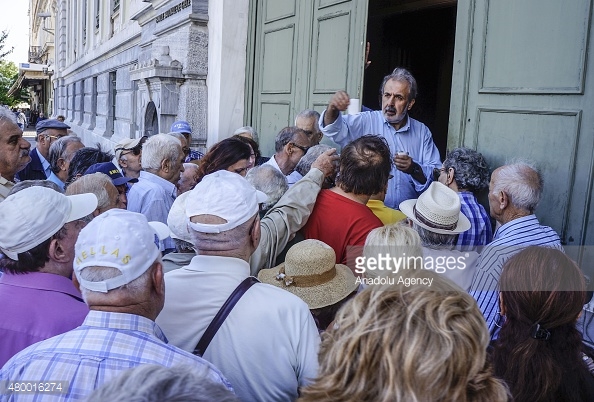Understanding the Greece Crisis, in Family Terms

My Sister Is Greece, I am the Troika
There’s always one black sheep in the family. In my family’s case, that sheep is my sister. While my two brothers and I have worked every day of our lives since we were 10 (started on the farm in Minnesota!), my sister has managed to be unemployed for all of her adult life. While many of those years have not been comfortable for her, she has lived in (a dodgy but air conditioned) house, had a bike for transportation, and the wherewithal to feed herself and her dog. She is alive today and not homeless through a combination of government subsidies, some entrepreneurial ingenuity, and a lot of family generosity.
Our family dynamics can give insight into the dilemmas the various constituents face within the European situation as pertaining to Greece. Since I’m currently in the strongest position financially, I am the acting Troika (the accepted title of group consisting of the European Union, the International Monetary Fund, and the European Central Bank). My mom, who has lost the most money to my sister, represents the socialist demographic who still supports endless subsidies – because she cares. My brothers are core Europe (they work pretty hard, act pretty responsibly), while my dad could be seen as the hardliners in Germany, who like Finance Minister Schauble, have just had enough and don’t want anything to do with the drama.
I really empathize with the situation the Troika faces in dealing with Greece. I have lent quite a bit of money over the last decade to my sister, and have seen no return. I therefore have put more onerous conditions on support. For example, while 15 years ago I loaned her money for a car (which she totaled), today I will only pay for items like basic food, clothing, and dental care. I certainly don’t want to see her homeless, or toothless, but I don’t want to lend or give her money for a new iPhone. I put conditions on my subsidies – I buy the food and give her the clothes, not the actual cash. I ask her to pay some part of the new bike.
Likewise, the IMF, the ECB, and European Union have been working with Greece for many years. Before the crisis, many countries in the EU loaned Greece money. When the crisis hit, and Greece’s finances crumbled, the Troika stepped in. They loaned money to the country, facilitated Greece’s default to private creditors, and rearranged (but did not forgive) Greek’s debts. Perhaps they were delusional- some think they were stubborn or selfish. Since then, Greece has done some reforms, but its economy isn’t recovering well or fast enough to pay everyone back. As lenders, the Troika wants to make sure they get their money back, and will only discuss loans with conditions. Unlike me, the Troika still thinks it can get all of its money back.
After decades of family support to our own black sheep, my family’s patience has undoubtedly worn thin. When my sister asks nicely for help, or when she does something to help my mom, I/we tend to be more generous. When she calls me with a snotty attitude and has an air of entitlement, I hang up the phone. Similarly, in recent months when Greece acts like a jerk (through it’s ex finance minister Varoufakis, for example), patience wears thin and the money dries up. Now that Greece appears to be working on a real plan in earnest, the rhetoric from Troika members is cautiously optimistic.
So where are we now? My dad and the hardliners in Germany keep saying “enough” and act tough. However, my dad doesn’t want to wake up and find my sister hurt, homeless, or hungry. Germans don’t want to wake up and hear that Greek citizens (especially pensioners and children) have no food or medicine. When push comes to shove, both will do enough to keep the essentials flowing.
My mom will insist that my sister deserves a better life (and a smartphone), and will continue support up to the point that her small retirement income can afford. Similarly, many factions in France, Spain, Italy, etc, advocate the recent “NO” vote and want unconditional support (from somewhere). My brothers, like most of Europe, will chip in with whatever the majority decides, but will gripe a bit, and want conditions as well.
My sister? Greece? Both may have hit the proverbial rock bottom. In my sister’s case, she has few assets and her liabilities are small and covered through various “aid packages,” yet she hasn’t made any steps toward a different future. We still wrestle with how we can incentivize her to change her behavior, but at least she has a roof and food. In the past week, perhaps Greece has also hit its bottom as citizens queue at ATMs, hoard basic goods, and find that key medicines are becoming scarce. Banks have been closed for a week, and unlikely to open soon. As a result, the Greek Prime Minister just signaled a new willingness to negotiate, and accept more structure for the government finances.
How do we make it work? Family is family. Both my sister and Greece’s government need (debt) forgiveness. Even if they have clearly behaved badly, and spent more than they earned, there’s no possible way they can move forward without relief. Given moral hazard considerations, she and Greece have no right to receive blank checks. No new TV or iPhone for my sister unless she gets a job. No additional billions of euros for Greece unless they trim their bloated government payroll. Neither my family nor the EU want to lose our sibling, we all just want fairness. My own family politics suggests that we will hear a positive outcome regarding an agreement between Greece and the Troika including debt forgiveness, and soon.





this seems facile and problematic. an analogy, like comparing states to families and “lean times” to family belt-tightening, doesn’t make the situation clear, only muddies it with personal animus. clearly lay out the history of this situation and make plain your own history as to your way of thinking. we all have motivations and our perspectives are clouded (often to make our compromised lives feel less compromised) through our own successes and failures within social circumstances. as you are in finance, and one assumes successfully, a reader will assume you have a worldview consonant with that occupation.
Great comparison!
Great article! I understand the moral hazard issues of Greece and the rest of Europe so much better now that I can relate it to the family dynamics. Thanks!
The family analogy is so apt. This is the clearest take on Greece’s situation I have come across to date.
Thank you Sara Zervos.
Thanks for your comments, Mary!
The situation with Greece and Europe finally makes sense to me! Thank you, Sara, for putting this current economic crisis into a context that I can understand and certainly relate to on a personal level!!
Thanks Michelle
While erudite economists may have issues with the analogy I think your post is spot on, at least for the average reader who is still not sure what the drama re: Grexit is all about. Hope to see more of these
thanks Sharmila! yes I intended this piece to appeal more people who don’t spend every day studying current account deficits and debt dynamics 🙂
Entitlements gone crazy. Discipline lacked should not be rewarded.